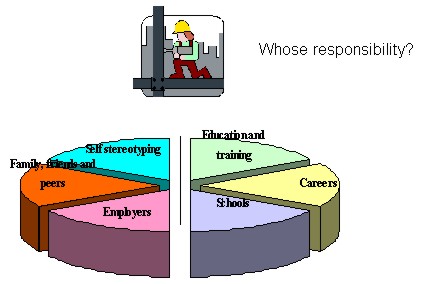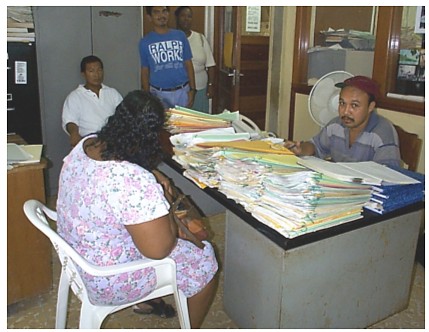| |
JOINT COMMISSION WORKING GROUP ON
UNDER-REPRESENTED GROUPS IN SURVEYING
 Visit the
Web
site of the FIG Working Group on Under-represented Groups in
Surveying
Visit the
Web
site of the FIG Working Group on Under-represented Groups in
Surveying
 This
Newsletter in -pdf-format
This
Newsletter in -pdf-format
Contents
Raising the Ratio - Information
by RICS
Let's TWIST and JIVE along with
WITBE
by Pat Turrell, UK
Personalities: Dr. Clarissa
Fourie, South Africa
Mainstreaming Gender Issues in
Land Administration
by Karin Haldrup, Denmark
Raising the Ratio -
Information
by RICS
10% of chartered surveyors in UK are women - many more than
in previous years but still not enough. The Raising the Ratio
team at RICS have developed a website that acts as a portal to
the huge amount of great work going on in this area, including a
profile of Hydrographic Surveyor Ruth Adams. More....
http://www.rics.org/careers/women_in_surveying/
Let's TWIST and JIVE
along with WITBE
by Pat Turrell
FIG Congress Washington in April 2002
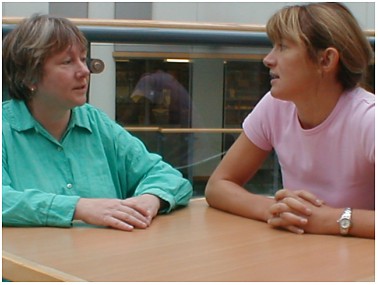 |
The visit to Washington D.C. by Sara Wilkinson
and Pat Turrell, to present our paper on The
Future for Women on Surveying at the FIG
International Congress in April 2002, was a great
opportunity to share experience and discuss issues with
female and male surveyors from around the globe. (It was
also a great opportunity to see the sights!) It was so
encouraging to hear of action and support for women in
surveying from places as far apart as Australia and
Sweden. On the other hand it was clear that barriers are
still there all over the world including the USA and UK,
and there is still a long and difficult road towards
mainstreaming and desegregating employment.
|
Let's TWIST and JIVE
The paper presented in Washington mentioned the success
achieved in winning funds for an EQUAL project aimed at
combating gender segregation in the labour market (within
engineering, construction, engineering and surveying sectors).
Let's TWIST started our work in 1998 and now the JIVE project is
picking up momentum and setting out its plans for the next three
years. This new European funded national project is adopting a
holistic approach e.g. little is achieved by just producing some
brochures that have women in them!
The project partners involve:
- Education (Bradford College, Sheffield Hallam University
and the Open University),
- Women's Training Schemes (The Women's Workshop, Cardiff;
Women's Education in Building, London and Oxford Women's
Training Scheme, Women's Training Network),
- The Equal Opportunities Commission,
- and two sector groups (Property Services National
Training Organisation and Engineering Construction Industry
Training Board).
The expertise of all of these groups will be working to
tackle barriers with a holistic approach as illustrated in the
illustration shown.
The areas we are working on include:
- Addressing gender stereotyping in careers advice and
recruitment
- Provision of a supportive environment in education and
training institutions
- Addressing the lack of peer-group support and role
models through a mentoring programme
- Addressing unhelpful attitudes
and practice in organisations and working with employers on
organisational culture
- Working with stakeholders and policy makers to influence
change and implement mainstreaming.
If it sounds ambitious and challenging, then you probably
understand what we are up against, but we have been given one of
the largest EQUAL budgets in order to achieve our targets, and
all partners are very excited about working on the project.
Action plans and working groups and recruitment are all ongoing
in order to reach our goals. If it sounds very grand and vague
then get in touch with us - we have a huge range of experience
and good practice to draw on to make a real difference and would
be happy to give more details.
Transnational
That is not the only exciting news! The project has two
transnational partnerships working with other groups in Europe
who are also engaged in overcoming gender segregation in the
labour market in similar sectors (together with IT). The first
partnership is with groups in Denmark, Sweden and Finland. The
second partnership is with groups in Germany and France. Both
partnerships will be able to share practice and materials and
work towards the mainstreaming we all keep hoping for!
WITBE
Sheffield is in an Objective One area and we have been
successful in gaining funds from Objective One to work in
construction and surveying. There is a serious shortage of
skilled labour in the construction industry and there is a lot
of regeneration work needed to improve the region. We are
working to give choice and opportunities to women to enter and
progress in the sector through short courses, upskilling
courses, taster days and outreach work with communities.
The whole cake!
All our work is based on the model pie chart or cake shown -
if we are at last to make a difference and enable women to take
their rightful place in careers like surveying and construction,
we cannot afford to ignore any of the slices of the pie.
Can you help?
- We are looking for interested parties who might be able
to help with the project :
- women mentors in industry for undergraduates or
schoolgirls,
- employers who would like to get involved in cultural
audits,
- those in policy making bodies who could assist in
dissemination,
- interested parties in the countries involved in
transnational partnerships as contacts and for networking
- or anyone who would just like to know more…
You can contact us at Sheffield Hallam University:
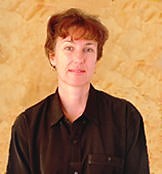 |
Dr. Clarissa Fourie has been
working with FIG since 1994 to develop innovative
approaches for developing countries and attended both
the meetings that led to the Bogor Declaration as well
as the Bathurst Declaration. She is presently an advisor
to Commission 7, Working group 7.1 on customary tenure
and titling and Working group 7.2 on land instruments
for land distribution. |
She has a Ph.D in Social Anthropology in the
area of change from customary to informal settlement tenure.
However, she has worked on projects involving land surveyors for
over 20 years, including as a Senior Lecturer in the Department
(now programme) of Land Surveying at the University of Natal
(Durban) for 7 years, where she ran the Land Management Msc and
taught land management. When she first joined the programme, the
late Professor Herman van Gysen, who courageously
appointed her to a survey school, in the first week lent her a
copy of Clara Greed’s ‘Surveying sisters: woman in a
traditional male profession.’ At that time she was the first
full time female appointment in the Faculty of Engineering at
the University.
She is presently an Honorary Research Associate
of the University of Cape Town, Department (now programme) of
Geomatics, while working full time as an international
consultant in the field of land management and land
administration.
Clarissa has combined her research and
consulting programmes to develop useful land
management/administration approaches for the developing world.
Some of the areas she has worked on include, the development of
local government level land registration services; the role of
sporadic titling in very poor countries; a spatial data
infrastructure that uses both cadastral and non cadastral data
as foundation data, for sub Saharan Africa and informal
settlements world wide; the integration of social and technical
tools to produce more viable land administration systems. She
has specialised in evaluating the extent to which existing
cadastral systems, or approaches to reform cadastral systems,
are pro-poor. All of this work has been published in a range of
international survey journals.
Her consulting work has mostly been focused on
Africa, but she has also worked in Indonesia, where she
undertook an analysis of the institutional framework of land
administration of the country, including the Departments of
Land, Spatial Planning, Tax and Forests. She has also undertaken
analyses for the United Nations. In 1999 she did an analysis for
Habitat of the socio-technical framework world-wide in relation
to tenure security and access to land, and in 1998 she undertook
an evaluation of the cadastre and GIS/LIS options for Africa for
the United Nations Economic Commission for Africa. She has also
worked on World Bank programmes, and for donors such as Swedish
aid (Sida) and British aid (Dfid).
Her work in Namibia designing local land
registration systems for peri-urban areas also included an
assessment of the impact of the system on women. Issues such as
divorce and inheritance procedures were assessed and procedures
developed which supported female user options.
In South Africa, appointed by the Minister of
Land Affairs to represent the public, Clarissa has been a
council member (and alternate) on the South African Council for
Professional and Technical Surveyors since 1995. Also in the
capacity of public representative, she sat on the committee
transforming surveying education in South Africa, in terms of
the National Qualifications Framework.
The transformation process in South Africa since
1994 has meant that many more doors have been opened to women
and the glass ceiling lifted, also in the survey field, which
has made it possible for them to become leaders in the industry.
This progressive approach in South Africa explains why Clarissa
is the third South African woman to be profiled in our
newsletters. That is, a country wide regulatory framework, based
on constitutional imperatives, which supports affirmative
action, can make an enormous difference to representivity in a
country’s survey industry.
Clarissa is married to wildlife artist and
author, Paul Augustinus, and they are based in Durban,
South Africa. Whenever possible they go to the bush, with
African rain forest safaris being top of the agenda.
To view her web site see
http://users.iafrica.com/a/au/augusart
Mainstreaming Gender Issues in Land Administration
Awareness, Attention and Action
by Karin Haldrup, Denmark
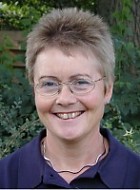 |
Karin Haldrup,
Denmark
|
The presentation at the FIG Congress 2002 in Washington, DC
was a supplement to the paper submitted to illustrate that the
widespread "gender blindness" in land matters is an issue that
we may all do something about, so that we as professionals at
least are aware of the problems, but the complexity of
rectifying the situation for the disadvantaged women of the
world, where the damage has already been done, is a long
struggle.
It is striking that surveyors have largely been absent in
research on women’s access to land (with notable exceptions),
and most research on land tenure in a socio-economic context has
been written by other professional groups (lawyers, economists,
anthropologists, etc.). This literature is rather scattered, but
there are central works, which stand out, such as works on South
Asia by Bina Agarwal (1), a professor of economy, and the
team of Carmen Diana Deere and Magdalena León (2),
professors of agricultural economy and of sociology,
respectively, authorities on land tenure in Latin America. I
warmly recommend reading these authors, who capture the
attention beyond the discussion of gender: By their deep insight
into land reforms and land tenure they communicate the nature of
the whole land tenure system, and I guarantee that even a reader
without any interest in gender questions will be captured by
their knowledgable accounts.
I was personally astonished when coming across the phrase
"dispossession of women" taking place during land registration
and land reforms, even documented in cool figures. No wonder
that there is inequality in the world, if property of a couple
passes (often unnoticed) into the formal and unrestricted
ownership of the head of the household, usually the man, and if
the male heirs are ensured a better share than their sisters.
Therefore the surveying profession at large has a lot to
catch up with, but it is not boring. One of the dramatic "high
points" of reading is the issue of the impact of family law,
which in many cases places women in vulnerable and miserable
positions, if they are widowed or divorced. Family law and the
inheritance systems are in fact very important factors for the
development of the tenure structure, in particular for
fragmentation, so the topic need to be at the attention of
surveyors for many reasons.
It is noteworthy that the most common way for women to gain
access to land is through inheritance, for which reason family
law is important when discussing gender. However, formal law is
one issue and the practices may be different. At first there is
the practical question of the civil status of women: many live
in consensual unions, so real protection should include such
cases as well.
In many societies there are norms against women owning land,
and the distance from the formal legal system to the practices
in the local area may be so large, that the formal legal system
is beyond reach for women in need thereof.
In all countries and areas there are variations or tensions
between the formal situation, enforcement, implementation and
the actual situation. Even in industrialised countries
significant deviations can be found, but in few places probably
as complicated as described by Rubya Mehdi in ”Gender
and Property Law in Pakistan – Resources and Discourses”,
2001. Mehdi has made research on the overlay of four legal
regimes (State laws, religious laws, and customay laws
/practises) and its effect on households in four villages. She
describes practices of law in the field of family relations with
focus on property relations within the family. Mehdi shows that
the woman frequently concludes that the greater potential
economic security is to surrender her right of inheritance to
her brothers, while the brothers do not always deliver this
security. The law provides a right, but economic circumstances
render that right empty.
An interesting part of the gender discussion is that it is no
more an isolated rights' issue, which is documented in the World
Bank Policy Research Report, "Engendering Development -
through Gender Equality in Rights, Resources and Voice",
2001. The chapter "Gender Inequality hinders Development"
documents costs to Well Being, Productivity and Growth, and
Governance.
As a consequence the UN-Habitat recommends to using “women”
as a primary indicator for the success of its interventions
within the Global Campaign for secure tenure, considering the
gender factor as one of the best monitors of changing
socio-economic relations. UN-Habitat has furthermore found that,
in the reduction of urban poverty, a focus on women has the most
beneficial effect, and that more people are assisted out of
poverty as a result of this focus, ref. to
http://www.unchs.org/tenure/vision.htm.
To conclude it was proposed to work towards mainstreaming of
gender issues by using this knowledge and prepare new literature
on land tenure, cadastre and land administration, taking into
account the needs of practitioners.
The paper further suggests action within the following areas:
- Gender disaggregated land data and gender sensitive
indicators
- Gender in plural legal regimes
- Socio-economic impact studies and monitoring
- Simple, local models of land administration
- Gender balance at all levels of organisations, and
- Participation of women in implementation.
Despite the daunting tasks at hand, the power of modern
communication gives reason for optimism. It has become easily
accessible to network with other interest groups and share ideas
and experience - as this newsletter demonstrates, all of which
are essential to meeting the challenge of developing new models
for land administrations and equitable access to land.
(1) Bina Agarwal, "A field of one's own, Gender and land
rights in South Asia", 1994.
(2) C.D. Deere and M. León, "Gender, Property and
Empowerment: Land, the State and the Market in Latin America",
2000.
Karin Haldrup, Denmark
E-mail:
[email protected]
|
Editor: Chair of the Joint
Commission Working Group on Under-represented Groups in
Surveying
Ms. Gabriele Dasse, Kleinfeld 22 a,
D-21149 Hamburg, Germany
E-mail:
[email protected]
2/02, month of
issue: October
© Copyright 2002
Gabriele Dasse.
Permission is granted to photocopy in limited quantity
for educational purposes.
Other requests to photocopy or otherwise reproduce
material in this newsletter should be addressed to the
Editor.
|
|

























